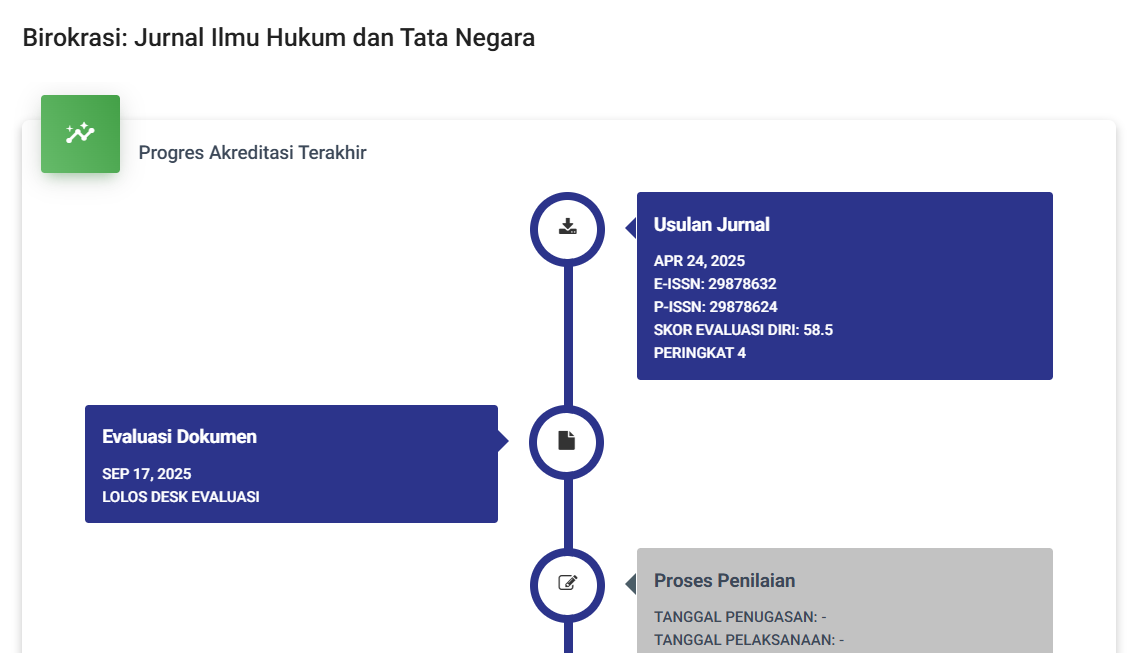Pengawasan Partisipatif Dalam Mencegah Pelanggaran Pemilu 2024: Studi di Bawaslu Kota Blitar
DOI:
https://doi.org/10.55606/birokrasi.v1i3.610Keywords:
Violation Prevention, Supervision, General ElectionsAbstract
Indonesia, as a rule of law country, establishes the conduct of General Elections (Pemilu) based on Article 22E paragraph (1) of the 1945 Constitution of the Republic of Indonesia: "General Elections shall be conducted directly, publicly, freely, confidentially, honestly, and fairly every five years." Elections are a form of democracy that underpins the sovereignty of the people, empowering them to play a crucial role in determining the government through the voting process. To ensure honest and fair elections, electoral supervision is of paramount importance. Electoral supervisors are tasked with overseeing and safeguarding all stages of the elections, ensuring compliance with the principles of direct, public, free, confidential, honest, and fair elections. Additionally, they ensure that the electoral organizers operate independently, honestly, fairly, with legal certainty, order, transparency, proportionality, accountability, effectiveness, and efficiency. The Election Supervisory Body (Bawaslu) plays a central role in overseeing the implementation of electoral stages and handling violations that may occur. This research employs the juridical-empirical method, which examines the actual conditions. The primary data sources are direct interviews with relevant parties, while the secondary data is based on laws, regulations, and data from the Election Supervisory Body of Blitar City.The research findings reveal the efforts of Bawaslu Blitar City in realizing participatory supervision in preparation for the 2024 simultaneous elections, including: a. Participatory Supervision for First-time Voters in High Schools, b. Participatory Supervision Education for the Academic Community of Blitar City, c. Involvement of Alumni of the Participatory Supervision Training Center. Despite the significance of participatory supervision, its implementation faces various challenges, such as low public participation in election supervision, the increasing complexity of election violations, and the lack of a comprehensive supervision curriculum by Bawaslu to equip the involved community in electoral supervision.
References
Arikunto, Suharsini, 1988, Prosedur Penelitian Suatu Pendekatan Praktek, Edisi Revisi IV, Rineka Cipta, Jakarta.
Back and Campion, 1999, Metode dan Masalah Penelitian Sosial, Bandung, Refika Aditama.
Bawaslu RI, 2015, Modul Bimbingan Teknis Bagi Anggota Panwas Kecamatan Pemilihan Gubernur, Bupati, dan Walikota Tahun 2015, Jakarta, 2015.
Bogdan dan Taylor dalam Moleong, Metode Penelitian Kualitatif, Bandung, 2000.
Deddy Hismatullah, Otonomi Daerah Dan Disentralisasi, Pustaka Setia, Bandung, 2010.
Janedjri M. Gaffar, Politik Hukum Pemilu, Cetakan I, Konstitusi Press Konpress, Jakarta: 2012.
Nurkinan, “Peran Partisipasi Masyarakat dalam Pengawasan Pemilihan Umum Serentak Anggota Legislatif dan Pilpres Tahun 2019”, Jurnal Politikom Indonesiana, Vol. 3 No. 1, Juli 2018.
Perdana, M. Taufan, Moh. Alfaris, and Anik Iftitah. 2020. “Kewenangan Bawaslu Dalam Pilkada 2020 Pasca Putusan Mahkamah Konstitusi Nomor 48/PUU-XVII/2019”. Jurnal Supremasi 10 (1), 1-11. https://doi.org/10.35457/supremasi.v10i1.940.
Sholahuddin, Abdul Hakam, Anik Iftitah, and Uun Dewi Mahmudah. 2019. “Pelaksanaan Pasal 280 Undang-Undang Republik Indonesia Nomor 7 Tahun 2017 Tentang Pemilihan Umum: Pelanggaran Kampanye Pemilu 2019 di Kabupaten Blitar”. Jurnal Supremasi 9 (2), 17-27. https://doi.org/10.35457/supremasi.v9i2.793.
Soekanto, Pengantar Penelitian Hukum, Jakarta, 1986.
Susila Wibawa, Kadek C.. "Pengawasan Partisipatif untuk Mewujudkan Good Governance dalam Penyelenggaraan Pemilihan Umum Serentak di Indonesia." Administrative Law and Governance Journal 2, no. 4 (2019): 615-628. Accessed : July 26, 2023. https://doi.org/10.14710/alj.v2i4.615-628
Tim Fakultas Hukum Universitas Muhammadiyah Malang, Pedoman Penulisan Hukum, Malang, 2007.
Yudiana, Teguh Cahya, Cut Hasri Nabila, and . Billiam. 2022. “E-Voting Dengan Electronic Voting Machine Dan Fingerprint One-Detect Verification Sebagai Katalisator Modernisasi Pemilu Di Indonesia”. Jurnal Supremasi 12 (1), 11-24. https://doi.org/10.35457/supremasi.v12i1.1641.
Undang-Undang Nomor 7 Tahun 2017 tentang Pemilihan Umum
Peraturan Badan Pengawas Pemilu Nomor 2 Tahun 2015 tentang Perubahan Atas Peraturan Badan Pengawas Pemilihan Umum Nomor 11 Tahun 2014 tentang Pengawasan Pemilihan Umum
Peraturan Badan Pengawas Pemilihan Umum Republik Indonesia nomor 7 tahun 2018 tentang Penanganan Temuan dan Laporan Pelanggaran Pemilihan Umum
Undang-Undang Nomor 10 Tahun 2016 tentang Perubahan Kedua Atas Undang-Undang Nomor 1 Tahun 2015 tentang Penetapan Peraturan Pemerintah Pengganti Undang-Undang Nomor 1 Tahun 2014 tentang Pemilihan Gubernur, Bupati dan Walikota Menjadi Undang-Undang
Peraturan Dewan Kehormatan Penyelenggara Pemilihan Umum Nomor 2 Tahun 2017, tentang Kode Etik dan Pedoman Perilaku Penyelenggara Pemilihan Umum








